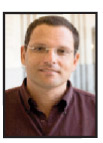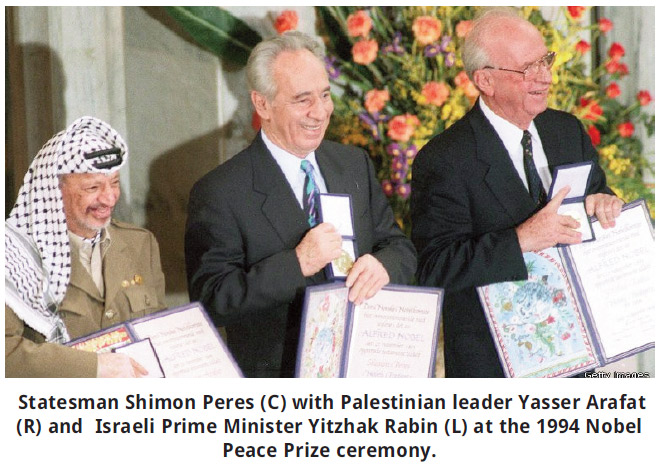
 |
MIDDLE EAST SCENE
A relentless fighter for peace is gone !
The year just gone by was a particularly sad one for Israel, the only democracy in the Middle East. On Friday, September 30, the Jewish Nation buried its last forefather: Shimon Peres. This was very sad not only for Israel but also for the entire peace-loving humanity in the world, the Middle East in particular . Glowing tributes were paid to Peres the world over. Eminent Professor of Political Science at the University of Hull, the United Kingdom, Raphael Cohen Almagor shares with the Power Politics his personal story about the statesman.
Another person
in Shimon's circle
of activists was a
young lady by the
name Zaavit
Skladman. She was
the Chairperson of
Manof, the
National Young
Labour Movement
in Israel. Manof
was both acronym
and a meaningful
title, as it means
crane in Hebrew. Shimon always
believed that the future is with the
younger generations thus he took
great interest in the Manof activities.
Her position allowed her a privileged
access to Peres. On 4 April 1994, he expressed "special gratitude" for a copy of my poetry book and reflected on my thesis in The Boundaries of Liberty and Tolerance: The Struggle Against Kahanism in Israel (1994) that democracies must present boundaries to liberty and tolerance; otherwise they might succumb to what I call "The Democratic Catch". Peres wrote: "… the government decided to outlaw the 'Kach' movement and it will continue to act strongly against those who wish to undermine Israeli democracy." "Having said that", Peres maintained, "mere legal decisions will not be useful if we will not act also in the education sphere. I hope we all will join forces". In 1994, Peres won the Nobel Prize for Peace. Zaavit and I sent him warm letter of congratulation to which Shimon responded at length. After thanking us for our warm words which "strengthened my belief and actions", Shimon spoke of vision of a new Middle East and the "building of a new region of peace and prosperity for the benefit of all people in the region". The Oslo Accord, wrote Peres, paved the way to peace with Jordan and opened new horizons to an allencompassing peace in the Middle East. "Israeli delegations visited Tunis, Oman, Bahrain and Qatar. Israeli mission was opened in Morocco and soon one will open in Tunis. The Gulf states including Saudi Arabia ceased the Arab boycott of Israel". The road is long and difficult as the Hamas terror is aimed to destroy the peace process but "it will fail as did all previous violent attempts. They all succumb to the will to live of all nations". In 1997, I organised an international conference in memory of Yitzhak Rabin. Guests arrived from all around the world. The main speakers of the opening night were Mrs Lea Rabin and Shimon Peres. I was delighted to share the stage with both of them. In 2005, Peres decided to leave the Labour Party and to join Ariel Sharon's party, Kadima. On 2 December 2005, Shimon wrote: "Indeed, it was difficult to decide to leave the party in which I worked for tens of years". But what is important is the end result. "I support Ariel Sharon as the person who will succeed in advancing peace in accordance with my vision and way". In 2006, Ehud Olmert convened a curious government that was comprised of Kadima, Labour, the ultra-Orthodox Shas Party, Gil (the Pensioners Party), and… Avigdor Lieberman's Israel Beitenu. Peres was appointed to serve as Deputy Prime Minister but he was not happy with the political constraints. On 17 May 2006, Shimon wrote: "The election results did not make it possible to comprise the government we wished for and to immediately embark on the way we pledged our electorate. But I hope that this government will know how to overcome the difficulties that lie ahead". Shimon voiced his hope that "we will succeed to speak with the moderate part of the Palestinian people, conclude the disengagement plan, support disadvantaged populations and repair social ills". In 2008, from the President Office, Shimon wrote about his recent visit to England. He had a somewhat difficult meeting with students at Oxford. On 7 December 2008, the undeterred, eternal optimist Shimon wrote: "The meeting with the Oxford students was loaded but we should not surrender to militancy. We will continue to voice Israel's stance from each and every platform". On 25 November 2012, President Peres wrote to thank Ori Arbel-Ganz, Asa Kasher and me for assembling "a most comprehensive and impressive volume" that will promote transparency, accountability and responsibility in Israel". This book is titled Public Responsibility in Israel (Hebrew, 2012). Interestingly, Peres said that he had found special interest in the articles concerning social responsibility of non-governmental actors. He wrote: "At the time when power of individuals can be greater than that of governments, social and environmental challenges do not stop at the threshold of governments alone. Without citizens' social responsibility, without sincere public obligation, without voluntariness based on good will rather than laws, we will find it difficult to bring sustained development and create a vital environment, lighted and green for future generations". Peres dedicated his life to the state of Israel. He cared deeply about its people and its security. Since the early 1990s, he was a relentless fighter for peace. Among all Israeli leaders, no one worked as hard as Shimon Peres to bring about peace. This was one of many dreams that Shimon had; but unlike many of his dreams, this one Shimon was unable to materialise, despite the best of efforts. His memory will live forever ! |
|



